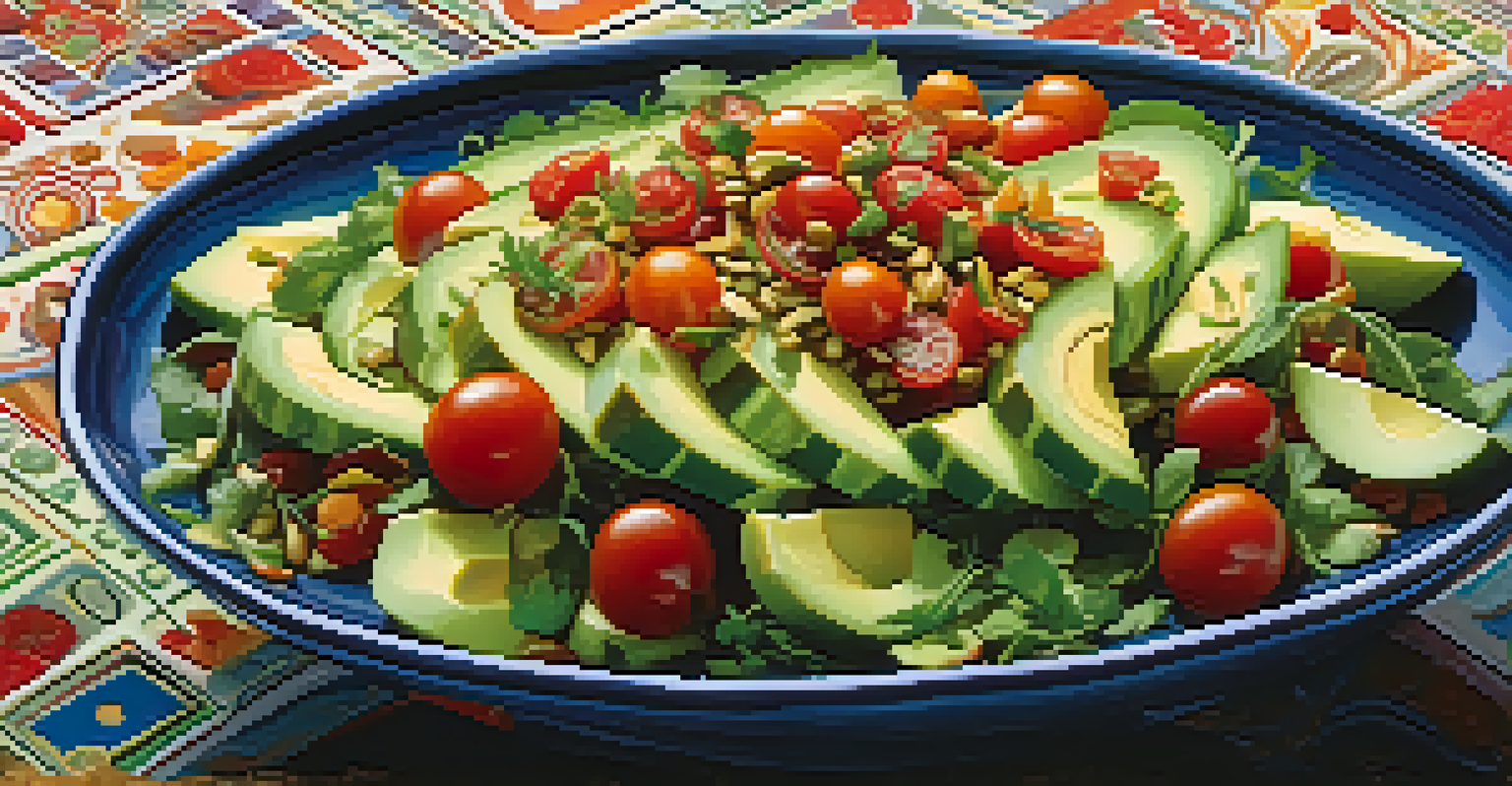The Impact of Raw Food Diets on Body Composition and Weight Loss

Understanding Raw Food Diets and Their Principles
Raw food diets primarily consist of unprocessed and uncooked foods, focusing on fresh fruits, vegetables, nuts, and seeds. The underlying belief is that cooking destroys essential nutrients and enzymes that are vital for health. Advocates argue that eating raw promotes better digestion and absorption of nutrients, leading to improved overall health.
Let food be thy medicine and medicine be thy food.
Many raw food enthusiasts adopt this lifestyle for various reasons, including weight loss, increased energy, and enhanced mental clarity. This diet can also be appealing for those looking to detoxify their bodies from processed foods and chemicals. However, it’s crucial to ensure that one maintains a balanced nutrient intake while following this restrictive diet.
It's important to note that there are several variations of raw food diets, including vegan raw, raw omnivore, and fruitarian approaches. Each type has its own set of guidelines and food restrictions, which can influence individual outcomes in body composition and weight loss. Understanding these nuances can help individuals tailor their approach to meet their specific health goals.
The Role of Caloric Deficit in Weight Loss
Weight loss fundamentally revolves around the concept of a caloric deficit, where you consume fewer calories than your body expends. Adopting a raw food diet can make it easier to achieve this deficit, as many raw foods are low in calories yet high in volume. This means you can eat substantial portions without overwhelming your caloric intake.

However, it’s essential to monitor how these foods fit into your overall dietary patterns. While raw fruits and vegetables are nutritious, they can also be high in sugars and carbohydrates. Balancing these with adequate sources of protein and healthy fats is crucial for sustainable weight loss and maintaining muscle mass.
Benefits of Raw Food Diets
Raw food diets can enhance nutrient intake, promote better digestion, and support weight loss through a caloric deficit.
Moreover, the fiber content in raw foods can contribute to feelings of fullness, helping to curb hunger and reduce the likelihood of overeating. When combined with physical activity, a raw food diet can support a healthy caloric deficit and promote weight loss effectively.
Nutritional Benefits of Raw Food Diets
Raw food diets are rich in vitamins, minerals, and antioxidants, all of which play key roles in maintaining overall health. Fruits and vegetables, in their natural state, are packed with phytonutrients that can combat inflammation and oxidative stress. This can lead to improved body composition as your body becomes more efficient at utilizing nutrients.
You are what you eat, so don’t be fast, cheap, easy, or fake.
Additionally, raw foods often have higher enzyme content, which can aid in digestion and nutrient absorption. For instance, enzymes found in raw fruits like papaya and pineapple can help break down proteins and facilitate smoother digestion, contributing to better metabolic health.
Despite these benefits, it’s crucial to be mindful of potential nutritional deficiencies, particularly in protein, vitamin B12, iron, and omega-3 fatty acids, which are often less abundant in a raw food diet. Supplementation or strategic food pairings can be vital to ensure comprehensive nutrition.
The Psychological Effects of Raw Food Diets
Adopting a raw food diet can have notable psychological implications, often impacting one's relationship with food. Many individuals report feeling more connected to their food choices, developing a greater appreciation for fresh, whole foods. This mindfulness can foster healthier eating habits and a more positive body image.
However, the restrictive nature of raw food diets can also lead to feelings of deprivation or social isolation, especially in social settings centered around cooked meals. It’s important to strike a balance that supports both mental well-being and physical health, perhaps by allowing occasional flexibility.
Challenges of Raw Food Diets
Maintaining a balanced nutrient intake and managing cravings can be significant challenges for those following a raw food diet.
Furthermore, the process of preparing raw meals can be therapeutic for some, as it encourages creativity and experimentation in the kitchen. Engaging with food in a hands-on way can enhance the overall experience of eating and contribute to a healthier mindset about nutrition.
Potential Challenges of Raw Food Diets
While raw food diets can offer numerous benefits, they also come with challenges that can impact body composition and weight loss. One major concern is the difficulty in maintaining a balanced diet, as it can be challenging to meet all nutritional needs solely through raw foods. This can lead to deficiencies that might hinder weight loss progress and overall health.
Another challenge is the potential for increased cravings for cooked or processed foods, especially if one feels deprived. This can result in binge eating or reverting to previous eating habits, which can negatively impact weight loss efforts. Finding strategies to manage these cravings is essential for long-term success.
Lastly, raw food diets often require significant time and effort for meal preparation, which can be a deterrent for many. Busy lifestyles may make it difficult to sustain a raw food diet, leading to inconsistency and potential setbacks in achieving body composition goals.
How Raw Food Diets Influence Body Composition
The impact of raw food diets on body composition can be quite distinct, primarily due to the high fiber and water content of raw foods. This can lead to a reduction in body fat percentage, as individuals often find themselves feeling fuller for longer, reducing overall calorie intake. Additionally, the nutrient density of raw foods supports muscle preservation during weight loss.
However, the effects on body composition can vary based on individual factors such as age, sex, activity level, and metabolic health. For some, a raw food diet may lead to significant weight loss and improved body composition, while others may not experience the same results if their energy needs are not adequately met.
Impact on Body Composition
Raw food diets can lead to reduced body fat and improved muscle preservation, but individual results may vary based on lifestyle factors.
Moreover, incorporating physical activity alongside a raw food diet can amplify positive changes in body composition. Engaging in strength training or cardiovascular exercises can help build lean muscle mass and enhance metabolic rate, contributing to a healthier body composition overall.
Conclusion: Is a Raw Food Diet Right for You?
Deciding if a raw food diet is suitable for you requires careful consideration of your individual health needs and lifestyle. While there are many benefits, including potential weight loss and improved nutrition, it’s essential to approach this diet thoughtfully. Consulting with a healthcare professional or a registered dietitian can provide personalized guidance based on your health goals.
If you’re considering transitioning to a raw food diet, starting gradually can help your body adjust. Incorporating more raw foods into your meals while maintaining some cooked options can strike a balance that supports both health and enjoyment.

Ultimately, the best diet is one that fits your lifestyle, preferences, and nutritional needs. Whether you choose a raw food diet or another approach, focusing on whole, nutrient-dense foods will always support your journey toward better health and body composition.